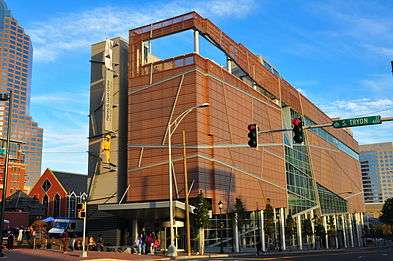Harvey Gantt
| Harvey Gantt | |
|---|---|
| Mayor of the City of Charlotte | |
|
In office 1983–1987 | |
| Preceded by | Eddie Knox |
| Succeeded by | Sue Myrick |
| Charlotte City Council | |
|
In office 1974–1983 | |
| Personal details | |
| Born |
Harvey Bernard Gantt 1943 (age 72–73) Charleston, South Carolina |
| Political party | Democratic |
| Children | 4 |
| Residence | Charlotte, North Carolina |
| Alma mater | Clemson University |
Harvey Bernard Gantt (born 1943) is an American architect and Democratic politician active in North Carolina.[1] The first African-American student to be admitted to Clemson University after attending Iowa State University, Gantt graduated with honors in architecture, earned a master's at MIT, and established a practice in Charlotte with a partner.
Gantt entered local politics, where he was elected to the city council, serving from 1974 to 1983. He was elected to two terms as the first black Mayor of Charlotte from 1983 to 1987. In the 1990s, he ran twice for the United States Senate against Jesse Helms, losing both times.
Life and career

Gantt was born in Charleston, South Carolina to Wilhelminia and Christopher C. Gantt, a shipyard worker. He started to participate in civil rights activism in high school. In 1963, he was the first African American to be admitted to Clemson University in South Carolina.[2] He received a degree in architecture with Honors from Clemson[3] and a Master's degree in City Planning from MIT.[4]
From 1974 until 1983, Gantt served on the Charlotte City Council. He was elected to two terms as the first African-American mayor of Charlotte, North Carolina,[3] serving in that position from 1983 to 1987. He was defeated for a third term as mayor in 1987 by Sue Myrick. A Democrat, in the 1990s, he staged two unsuccessful U.S. Senatorial campaigns against Republican Jesse Helms in 1990 and in 1996, gaining 47% and 46% of the vote, respectively.[3]
He manages a successful architectural practice, Gantt Huberman Architects, and remains active in politics. He served on the North Carolina Democratic Party Executive Council, the Democratic National Committee, and was appointed as chair of the National Capital Planning Commission in Washington, DC.[3]
In 2009, the Afro-American Cultural Center and the City of Charlotte honored Gantt by building the Harvey B. Gantt Center for African-American Arts + Culture, recognizing his contributions to the civil rights movement and as the city's first black mayor. The four-story, 46,500-square-foot building was built for $18.6 million, and is part the Levine Center for the Arts.[5]
In 2016, PBS Charlotte and UNC-TV featured Gantt in their online series, Biographical conversations. In this series, Gantt recalls his life experiences, ranging from his attendance at Clemson University to his inauguration as Mayor of Charlotte, North Carolina.[6]
Together he and his wife Lucinda (Brawley) Gantt, who was the second black student at Clemson, had four children: Sonja, Erika, Angela and Adam.[3] Their daughter, Sonja Gantt, is a former news anchor at WCNC-TV in Charlotte.[7]
References
- ↑ Eisiminger, Skip, editor, "Integration with Dignity", Clemson University Digital Press, Clemson, South Carolina, 2003, ISBN 0-9741516-1-0, page 2.
- ↑ Bass, Jack and W. Scott Poole, The Palmetto State: The Making of Modern South Carolina. University of South Carolina Press, Columbia, S.C., 2009, ISBN 978-1-57003-814-3, pp. 101-102.
- 1 2 3 4 5 "Harvey Gantt". Under the Dome. Newsobserver.com. Retrieved 31 August 2010.
- ↑ "Harvey Gantt MCP'7O". Infinite Connection. MIT. Retrieved 31 August 2010.
- ↑ "Nonprofits & Philanthropy | The Y9 Group". www.they9group.com. Retrieved 2016-02-12.
- ↑ "Watch Full Episodes Online of Biographical Conversations With... on PBS | Harvey Gantt: Episode 1: The Young Pioneer". PBS. Retrieved 2016-02-26.
- ↑ "Sonja Gantt: Anchor". WCNC-TV. Retrieved September 12, 2012.
External links
- "Harvey Gantt" City of Charlotte biography
- SC African American History
- Harvey Gantt and the Desegregation of Clemson University, Clemson website
- "Interview with Harvey B. Gantt", at Oral Histories of the American South, University of North Carolina
- Harvey Gantt Papers: J Murrey Atkins Library, UNC Charlotte
| Political offices | ||
|---|---|---|
| Preceded by Eddie Knox (D) |
Mayor of Charlotte, NC 1983–1987 |
Succeeded by Sue Myrick (R) |
| Party political offices | ||
| Preceded by Jim Hunt |
Democratic Party nominee for United States Senator from North Carolina (Class 2) 1990 and 1996 |
Succeeded by Erskine Bowles |